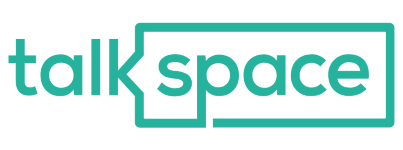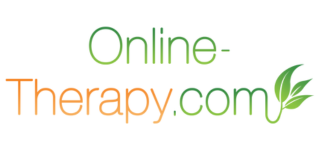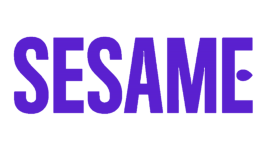Table of Contents
These products & services are researched and tested by HelpGuide’s independent consumer reviews partner. When you buy through the links, we earn a commission.
- We researched over 70 online therapy platforms and signed up for and tested 14 of the most popular to create our list of the seven best online therapy platforms.
- We surveyed 1,200 online therapy users, held focus group interviews with both users and therapists, and consulted with more than 60 mental health experts.
- Collectively, we’ve spent more than 7,500 hours researching online therapy.
We know that getting access to affordable mental health care as soon as you need it has become, for some, an insurmountable task. Online therapy can help connect you to a licensed professional who can help—fast. We found that the average cost, without insurance, for a weekly online therapy session was $81, and the average monthly subscription for online therapy with four live sessions cost $325. To help you find the best platforms, our Handbook team researched 70 sites, signed up and tested 14 excellent options, and narrowed our list down to the top seven that we recommend.
Our best overall online therapy pick
BetterHelp is our top pick for online therapy because it had the highest ratings for therapist satisfaction according to our survey, it offers the largest selection of therapists to choose from, it can match you with a therapist within 48 hours, and it offers group sessions with every membership. Get 20% off your first month with HELPGUIDE20.
Here are our top affordable online therapy platforms:
- BetterHelp: Best overall
- Talkspace: Best for using insurance
- Online-Therapy.com: Best for making lasting changes
- Sesame: Fastest appointment time
We recommend these platforms if you are looking for a specific type of care:
- Brightside: Best for psychiatry and medication management
- ReGain: Best for couples
- Zocdoc: Best provider directory
Which online therapy platform is right for you?
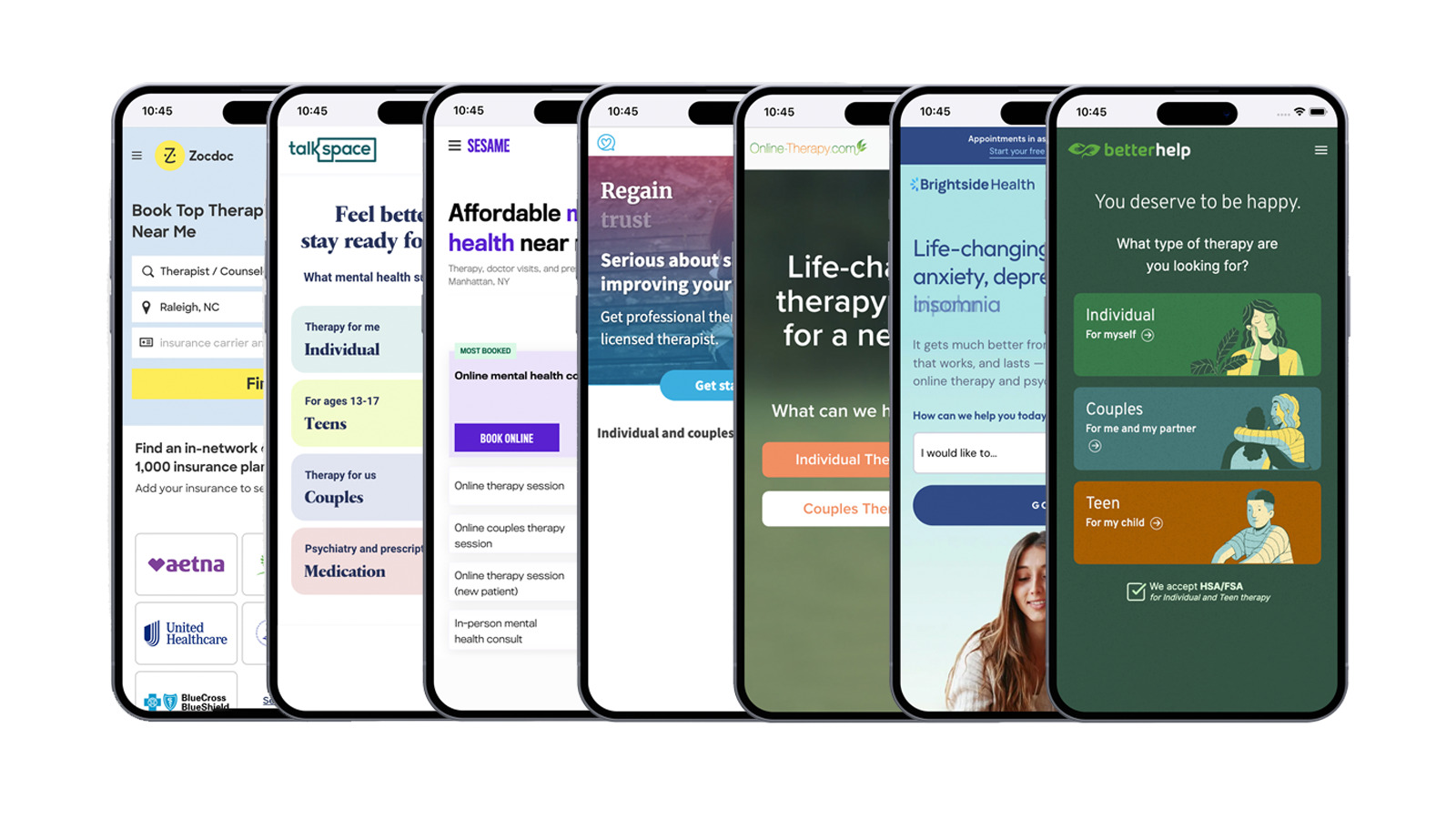
Consider whether the platform offers pay-per-session therapy or monthly subscriptions, how you want to connect with your provider, and how the platform helps you find the therapist that best suits your journey. We researched over 70 online therapy platforms and tested 14 of the most popular to help you choose from the best online therapy platforms.
Why HelpGuide cares about access to immediate, affordable mental health care






It’s not hard to see why mental health is one of the World Health Organization’s basic human rights. Mental health affects our mood, thoughts, physical health, relationships, and everyday actions and reactions.
Mental health care can be a transformative experience for individuals. … Knowing who we are and learning to care for ourselves well allows us to live out healthy boundaries; feel fulfilled; engage in relationships in a healthy way; feel grounded, secure, and connected; practice our values consistently; and take steps towards a healthy life.
Jillian Zeitler, LPC at Mountainside Treatment Center in Canaan, Connecticut.
We believe that everyone should have access to mental health support when they need it. Access includes:
- Being able to afford mental health care.
- Being able to speak to a professional as soon as you want.
- Being able to connect with a professional who understands your experience and makes you feel seen and comfortable while you’re feeling vulnerable.
When the Handbook team analyzed public data about psychology professionals, we found that not all Americans have the same level of access to a therapist. Therapy deserts are regions where individuals have few or no choices in mental health care providers. In New York City, which has a population of 8.3 million, there were 38 licensed therapists for every 100,000 New Yorkers in 2023. In comparison, in 2021, the state of Texas had the second-highest population in the country at 29.5 million, but there were only 17 therapists for every 100,000 Texans. For a city with a population three times less than Texas, New Yorkers have twice as many therapists to choose from, schedule with, and get mental health care from.
Though therapy deserts are often in rural areas, people in large metropolitan areas may not always have easy access to therapy, especially when factoring in the time and commute needed to get there.
I was in such a low in my life, and I was living in Southern California. I can’t drive, it’s such a struggle here. Even going 20 miles sometimes takes an hour and a half. So, I cannot even think about going into an actual stereotypical office and couch for therapy. Absolutely not.
Focus group participant, online therapy user
Online therapy allows more individuals to get the mental health support they need. In our November 2023 survey of 600 online therapy users, 83 percent shared that these sessions were effective in addressing their mental health concerns.
There [are] clients that are agoraphobic or they have so much anxiety… and I’ve just seen some people that are just paralyzed, and so being able to seek therapy virtually is a godsend for them.
Focus group participant, therapist
Respondents expressed that they were more comfortable attending therapy at home, had more flexible appointment scheduling, and didn’t miss the commute to their provider’s office, among many other benefits of online therapy.
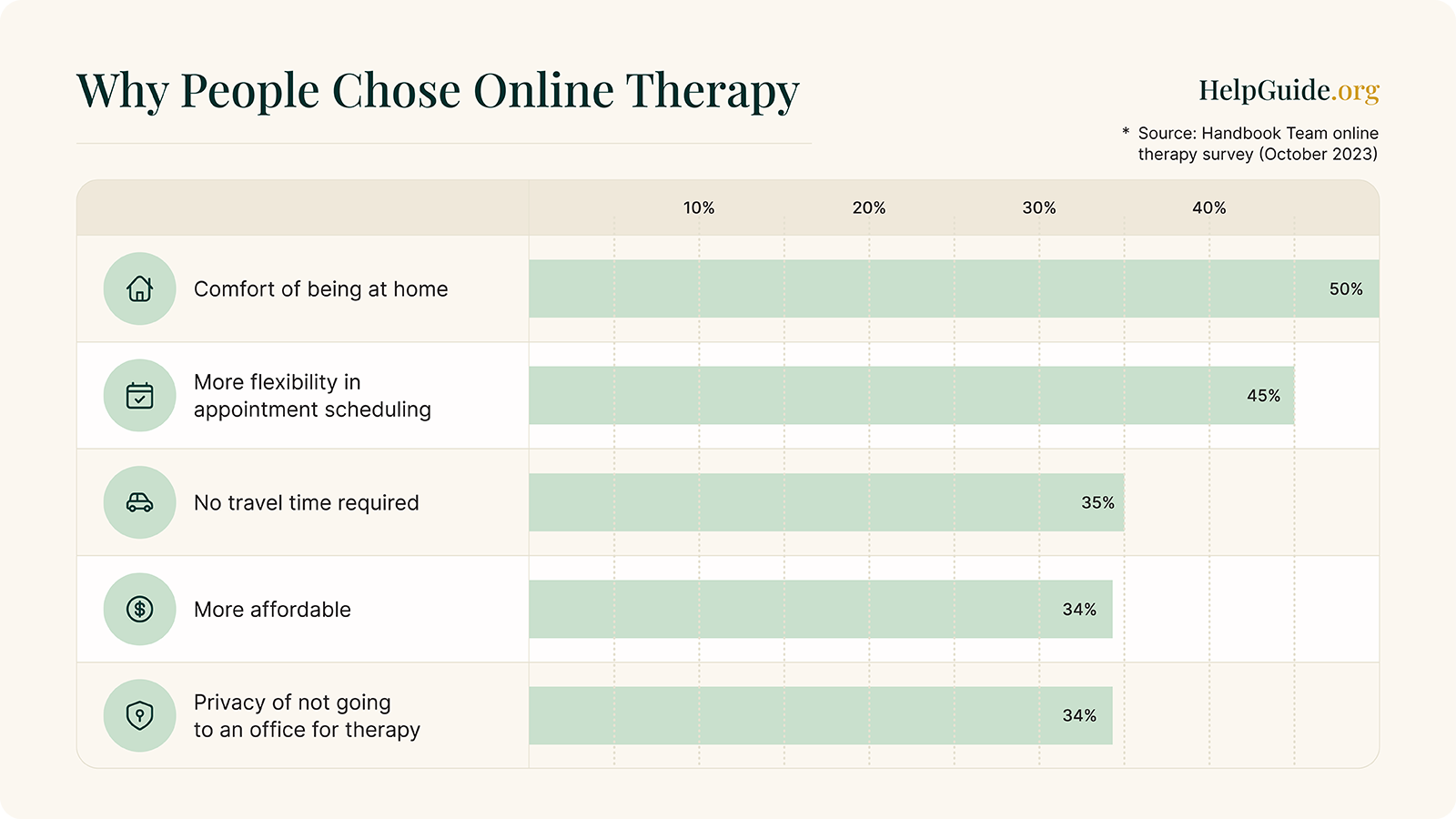
Collectively, our Handbook Team has put in more than 7,500 hours of research, testing, and evaluation to review online therapy platforms, down to the fine print. Mental health care is such a personal, impactful, and essential part of whole-person wellness. We wrote this review to guide you in finding a provider who can best support you in your mental health journey.
Online therapists may not be the most appropriate resource to help in a mental health crisis. If you or someone you know is a danger to themselves or others around them, it is an emergency, and it cannot wait for an online therapist’s response.
Don’t wait. You can find help immediately by:
- Calling or texting 988 for the Suicide & Crisis Lifeline
- Chatting online at 988lifeline.org
- Calling the Substance Abuse and Mental Health Services Administration (SAMHSA)’s Helpline at 1-800-662-4357 or texting your zip code to 435748
All the above options will connect you with trained professionals who can provide crisis support.
Compare the best online therapy platforms of 2024
| Platform | Services | Ways to Connect | Monthly Cost for Individual Therapy | Learn More |
|---|---|---|---|---|
| Individual therapy | Messaging; Text, audio, or video sessions | $260–$360 | Visit Site | |
| Individual therapy; Couples therapy; Teen therapy; Psychiatry | Messaging; Text, audio, or video sessions | $276–$436 | Visit Site | |
| Individual therapy for adults; Psychiatry | Messaging; Video sessions | $300–$352 | Visit Site | |
| Individual therapy; Couples therapy | Messaging; Text, audio, or video sessions | $200–$440 | Visit Site | |
| Individual therapy for adults; Couples therapy; Psychiatry | Audio or video sessions | Depends on provider | Visit Site | |
| Individual therapy; Couples therapy | Messaging; Video sessions | $260–$360 | Visit Site | |
| Individual therapy; Couples therapy; Psychiatry | Audio or video sessions | Depends on provider | Visit Site |
The best online counseling reviews
BetterHelp: Best overall
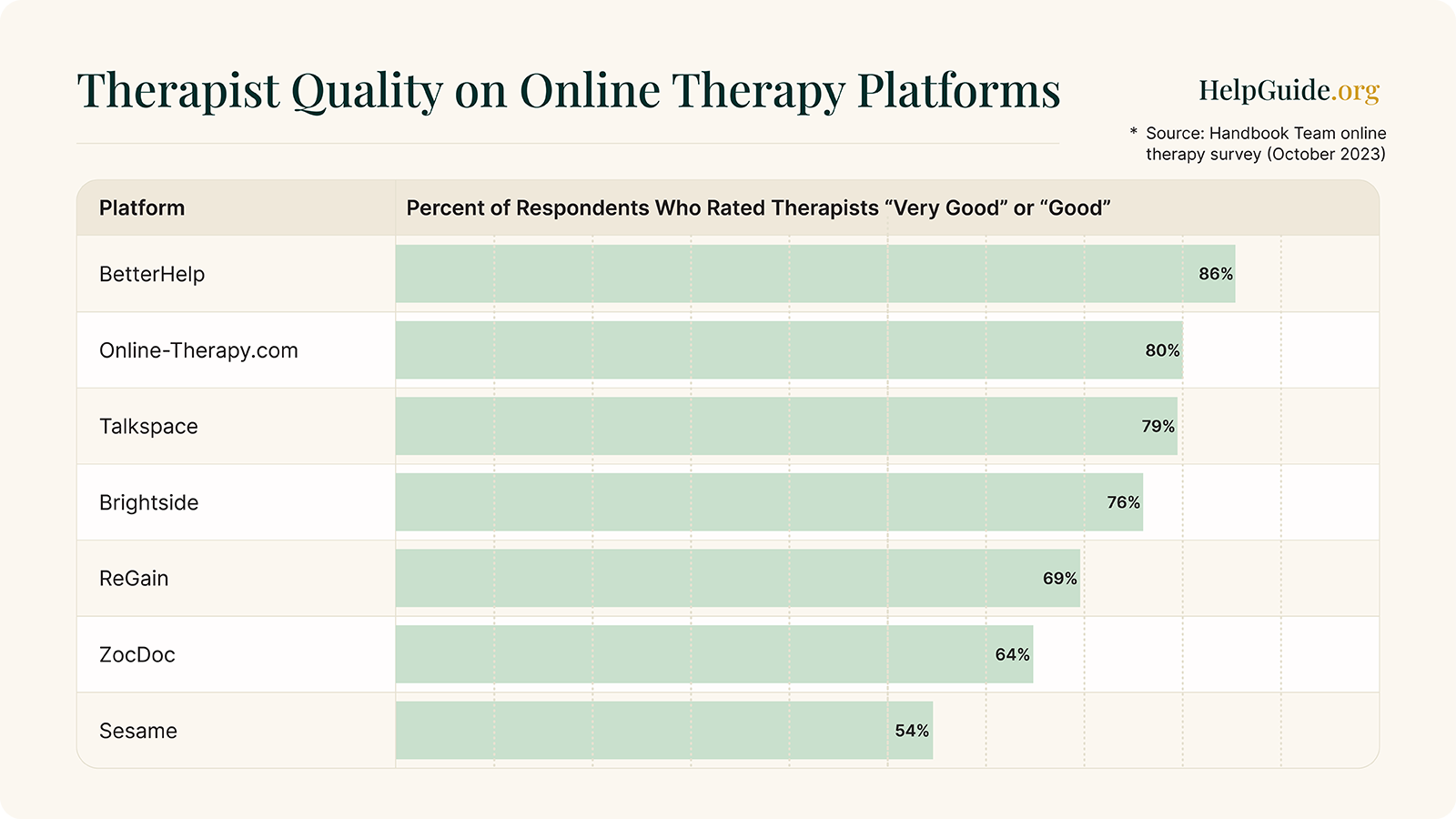
Talkspace: Best for using insurance coverage
Online-Therapy.com: Best for making lasting changes
Sesame: Fastest appointment times
Brightside: Best for psychiatry and medication management
ReGain: Best for couples
Zocdoc: Best provider directory
Other brands to consider
We tested many other online therapy platforms in order to find the best. Though they didn’t make it into our top recommendations, these platforms might be right for your specific situation.
Calmerry
Calmerry is a subscription-based online therapy platform with three plans:
- Messaging: $228 per month.
- Messaging + One Live Video: $298 per month.
- Messaging + Four Live Videos: $360 per month.
The platform has a reflection chatbot with daily prompts, and unlimited messaging is included with every plan.
We didn’t like that provider choice may be limited depending on location. Our tester had a difficult time finding providers that fit their needs and were only offered three possible providers by customer service. With brief 30-minute live sessions, sometimes our tester didn’t get the full session time with their provider if the provider entered late and had more appointments to attend right after.
We recommend Calmerry if you prefer connecting with your provider regularly through messaging.
Talkiatry
Talkiatry is an online psychiatry provider available in 43 states. It’s a large network of psychiatry providers that users can get matched with. Users can switch providers anytime, and psychiatry providers can refer you to a therapist to provide supportive care. Sessions are pay-per-session, so you won’t have to worry about a membership fee or monthly subscription. Unlike Brightside, Talkiatry doesn’t have an app or extra resources that can integrate your mental health care with its providers.
Unfortunately, this platform isn’t yet widely available for everyone. Its providers are in-network with a few insurance plans, and the platform doesn’t accept patients who are out-of-network. As of this writing, it’s currently not available in North Dakota, South Dakota, Idaho, Wyoming, New Mexico, Alaska, Hawaii, and Delaware. The practice also doesn’t provide treatment for people with schizophrenia, eating disorders, or medication-assisted treatment for substance use disorders.
We recommend Talkiatry if you’re in-network with its providers, live in one of the 43 eligible states, and are looking for pay-per-session online psychiatry providers.
Open Path Collective
Open Path Collective is a directory of providers who offer lowered rates to make therapy more accessible. To book with providers, you’ll have to become a member by paying a one-time fee of $65 for a lifetime membership. You’re eligible for a membership if you:
- Cannot afford the full cost of therapy.
- Don’t have insurance coverage or are underinsured.
- Have an annual household income below $100,000.
Providers on Open Path Collective offer members sessions that cost between $40 to $70. Student interns in the network offer therapy for $30 per session, which Lam recommends considering. “Actually, sometimes there are very experienced therapists who may not be a good fit for [you], and sometimes there are interns and trainees who are more affordable and who actually have that therapeutic presence and that sort of personal connection [you] can feel,” he says.
Similar to other networks of therapy providers, Open Path Collective doesn’t offer messaging or other features with its membership.
Mental health resources for underserved populations
We believe mental health care should be accessible to everyone, and individuals should be able to find therapists who can relate to their unique identities.
In researching online therapy platforms, we took note of the resources and directories for underserved minorities. For example, networks like Inclusive Therapists offer therapy for intersectional identities.
Therapy for Black Girls is a great mental health resource (including a blog and podcast by a licensed therapist) for Black women and girls. It has a provider directory to find providers who can provide supportive care.
Similarly, Therapy for Black Men is a directory of providers specializing in creating access to mental health care for Black men. It also has a financial assistance program to provide free therapy sessions for Black men.
Brands we don’t recommend
In our research, we encountered some online therapy platforms that we thought weren’t safe for our readers. Here are some popular online therapy platforms we don’t recommend.
Cerebral
Cerebral, like Brightside, is an online mental health platform that offers plans for therapy and psychiatry. Unlike Brightside, it also offers medication delivery through its online pharmacy, CerebralRx. Cerebral has a history of overprescribing controlled medications, making it difficult for its users to cancel their subscriptions, and sharing patient data with advertisers.
According to a CBS News review done after whistleblowers at Cerebral called attention to the overprescription of controlled substances, just five of the 1,500 prescribers on the site were board-certified psychiatrists. The vast majority were prescribers in unrelated fields, such as nurse practitioners who didn’t specialize in psychiatry. Some patients reported receiving up to five different prescriptions after spending just minutes with the prescriber.
As of May 2022, Cerebral providers can no longer prescribe controlled substances.
7 Cups
7 Cups is a chat-based platform that advertises “free online therapy and counseling.” However, messaging with a therapist is actually $150 per month, and therapist availability is extremely limited to one or two providers for most states we searched for.
What’s more, the “free” messaging is either with an AI chatbot or a volunteer “listener.” Listeners on 7 Cups have no credentials and aren’t verified to be safe.
We experienced first-hand how unvetted listeners can create uncomfortable or dangerous interactions with 7 Cups users. After signing up for an account, we were connected to a listener who started off the conversation by sharing that they were feeling down because of “sexual problems.” We somehow became the listener and were very uncomfortable about the start of the conversation. We immediately ended the chat and reported the listener because of the interaction.
Its platform also advertises listener chats for teens, which we are very wary of because of the platform’s lack of oversight for listeners in general.
We do not recommend 7 Cups because of its misleading “free therapy” claim and its listener chat, which can be unsafe for vulnerable users looking for mental health support.
What you need to know about our online therapy research and testing
These are the five things you need to know about online therapy:
Our testing experience
The Handbook team researched more than 70 online therapy platforms, directories, and networks. Based on our research, we signed up for the top 14 platforms to test out for ourselves. Here’s what we did with each online therapy platform:
Testers explored the platforms and attended online therapy sessions for at least four weeks. Our testers were instructed to test the platforms through the lens of a real user, paying attention to how easy or difficult it was to find a therapist they could talk to. Testers logged their experience in a diary and came together to share their findings when testing concluded.
We learned that most testers felt the need to switch providers, especially the ones testing platforms that initially matched users to their providers. Our challenge was to test and evaluate the features and experience of the platforms themselves rather than the care from individual providers. We were surprised when we encountered the lack of choice in providers on some platforms. For example, when our Calmerry tester was looking for a provider of color in their state, they were given three choices, none of whom matched the tester’s preferences.
From our tester
“I was only given three [therapist] options and still couldn’t get the type of therapist I was looking for. When I didn’t find the therapist I was looking for, I felt unseen and underrepresented. Often, I’m reminded that I am a minority due to the lack of representation of someone who looks like me. This was just another example of that.”
Still, we were pleased that most of our testers had positive interactions with the providers they chose. “I’ve been through many therapists before, but I was surprised when I found a therapist who specialized in my concerns and had a different approach to therapy,” said one tester. “I learned a new perspective to frame my ongoing concerns and got to connect with a caring provider that I felt comfortable with.”
We rated each online therapy platform we tested based on our findings and chose our top seven to share with you in this review.
Data privacy on mental health platforms
Conversations between you and your mental health care provider can be very personal and sensitive. In our October 2023 survey of online therapy users, about three in four (77 percent) of respondents said that the digital privacy of an online therapy platform was extremely or very important to them. Online therapy platforms have a responsibility to safeguard their users’ data in the following ways:
- Health care providers are responsible for protecting your personal health information (PHI) under HIPAA.
- Platforms aren’t allowed to sell or use your PHI for marketing purposes without your permission under the Health Information Technology for Economic and Clinical Health (HITECH) Act.
What’s covered by HIPAA?
The HIPAA Privacy Rule protects your PHI from being disclosed to other parties to ensure your privacy. Your PHI can include your name, zip code, birth date, and contact information, collected from your medical record and used to make your health care decisions.
Although the information shared between you and your online therapy provider may be considered PHI, data collected by the online therapy platform may not be. In contrast to PHI, personally identifiable information (PII) can still be the same information—your name, date of birth, zip code, etc.—but it’s not covered under HIPAA. PII can also be data collected through questionnaires (i.e., onboarding questionnaires for online therapy platforms), which may be disclosed to third parties with your consent.
How your data is collected and used can be outlined in a Terms and Conditions agreement, Privacy Policy page, or a website disclosure. Many sites have Terms and Conditions that assume your consent to data collection simply by using its website, but some online therapy sites we visited had a popup asking you to acknowledge their data-sharing policy.
Your PII is protected under the Privacy Act of 1974 from being disclosed without your consent. Unlike the HITECH Act, there currently aren’t any laws that regulate the collection and sale of PII by private companies like online therapy sites. The Federal Trade Commission (FTC) is a federal agency that enforces laws that protect consumers’ privacy.
Despite this, data privacy concerns have been raised about major online therapy platforms like BetterHelp and Talkspace, namely for disclosing users’ personal data to advertisers without users’ consent. In July 2023, BetterHelp settled with the FTC and agreed to pay $7.8 million to affected users, among other remedial steps to protect user data. When we reached out to BetterHelp, the company clarified that it is not regulated by HIPAA because they are not a covered entity—a health plan, health care clearinghouse, or a health care provider. BetterHelp states that its platform is now certified by the Health Information Trust Alliance (HITRUST), a health industry data security program, and that all messages between you and your therapist are encrypted using 256-bit encryption.
According to the Mozilla Foundation’s *Privacy Not Included, Talkspace updated its privacy policy to state that it “doesn’t sell client information to third parties.” However, it still uses its users’ personal data for marketing, tailored advertising, and research purposes.
Data privacy concerns aren’t limited to online therapy platforms. With any online app or platform, we recommend reading through their privacy policies to understand what data will be collected, how it will be collected, and what the platform does with your data.
Here are links to read more about the privacy policies of the platforms we recommend:
Handbook Tip 1
In addition to understanding how your data is collected and used before signing up for a platform, we recommend the following basic steps that we learned from the U.S. Department of Health and Human Services (HSS) and Mozilla Foundation’s *Privacy Not Included project:
- Attend your online therapy appointment in a private location, preferably not on a public Wi-Fi network.
- Use your personal computer when possible.
- Look out for checkboxes during sign-up to opt out of data tracking or medical information disclosure.
- Sign up with your email, not using a social login like Facebook.
- Choose a strong password to create a secure account login.
What a therapist can disclose
Although your sessions with your therapist are private and confidential, licensed therapists are required to disclose whether their clients are a danger to themselves or others around them. This means alerting local emergency services if they believe you are going through a mental health emergency.
If you have any concerns about your privacy and confidentiality while receiving therapy, we recommend asking your provider about the limits of confidentiality. This conversation may help you fully understand when and why your provider may disclose your information outside your sessions.
Frequently asked questions
Online therapy, also known as virtual therapy or online counseling, is a way to receive therapy virtually on your mobile device, laptop, or personal computer. To attend an online therapy session, you need an internet connection, a device with a microphone and camera, and a safe and quiet space.
Online therapy platforms may offer the following ways to connect with your therapist:
- Messaging: Like a text exchange, you and your therapist can leave and reply to text, audio, or video messages in between sessions.
- Live text sessions: A session where you and your therapist communicate through text only.
- Live audio sessions: A session where you and your therapist communicate through a phone or audio call.
- Live video sessions: A session where you and your therapist communicate through a video conference call via an app, browser, or video conference program.
The cost of online therapy can vary widely. Depending on whether you’re using your insurance coverage or paying out of pocket, prices can span from a $10 copay to $300 per session. For subscription-based online therapy platforms, we found that a weekly session costs $81 on average, and an average monthly subscription with four live sessions costs $325 per month.
Online therapists can’t prescribe medication. Online psychiatrists are able to diagnose and prescribe medications if they deem appropriate for your case.
Among the online therapy platforms we reviewed, Talkspace, Brightside, and some providers on Zocdoc take insurance. We chose Talkspace as our top online therapy platform for using insurance.
Online therapy sessions on the platforms we tested were between 30 to 45 minutes long.
- 2020 National Survey on Drug Use and Health (NSDUH). (2022). Substance Abuse and Mental Health Services Administration. Link
- Mental Health. (2022, June 17). World Health Organization. Link
- U.S. Census Data for Social, Economic, and Health Research. IPUMS USA. Link
- Livingston, K. (2022, May 18). America’s mental health care deserts: Where is it hard to access care? ABC News. Link
- Population Estimates for New York City and Boroughs as of July 1, 2022. (2022, July 1). New York City Planning. Link
- License Statistics for Psychology. (2023, July 1). New York State Education Department Office of the Professions. Link
- Lin, L., Stamm, K., & Christidis, P. (2018, February). How diverse is the psychology workforce? Monitor on Psychology, 49(2): 19. Link
- Access to Care Data 2022. (2022). Mental Health America. Link
- NYC Teenspace. NYC Health Department. Link
- What is Cognitive Behavioral Therapy? (2017). American Psychology Association. Link
- Cognitive Behavioral Therapy. (2016, September 8). InformedHealth.org Link
- Certified Community Behavioral Health Clinics Providing Expanded Access to Mental Health, Substance Use Care During COVID-19 Pandemic. (2021, May 25). National Council for Mental Wellbeing. Link
- Brooks, M. (2023, May 24). U.S. psychiatrist shortage causing months-long wait times. Medscape. Link
- Kamenov, K., Twomey, C., Cabello, M., Prina, A.M., & Ayuso-Mateos, J.L.. The efficacy of psychotherapy, pharmacotherapy and their combination on functioning and quality of life in depression: a meta-analysis. Psychological Medicine, 47(3): 414–425. https://doi:10.1017/S0033291716002774
- What Part B Covers. Medicare.gov. Link
- Average Cost Per Procedure, Mental Health Services. (2023). MN Community Measurement. [PDF] Link
- Consumer Expenditures – 2022. (2023, September 8). U.S. Bureau of Labor Statistics. Link
- Types of Mental Health Professionals. (2020, April). National Alliance on Mental Illness. Link
- Your Rights Under HIPAA. U.S. Department of Health and Human Services. Link
- CAMS Framework. CAMS-care. Link
- HITECH Act Enforcement Interim Final Rule. (2017, June 16). U.S. Department of Health and Human Services. Link
- The HIPAA Privacy Rule. (2022, March 31). U.S. Department of Health and Human Services. Link
- The Privacy Act. (2022, August 31). U.S. Department of Health and Human Services. Link
- Protecting Personal Privacy. U.S. Government Accountability Office. Link
- Privacy and Security Enforcement. Federal Trade Commission. Link
- FTC to Ban BetterHelp from Revealing Consumers’ Data, Including Sensitive Mental Health Information, to Facebook and Others for Targeted Advertising. (2023, March 2). Federal Trade Commission. Link
- Kelly, M. (2022, June 23). Talk Therapy Apps Face New Questions About Data Collection From Senators. The Verge. Link
- BetterHelp, Inc., In the Matter Of. (2023, July 14). Federal Trade Commission. Link
- Covered Entities and Business Associates. (2017, June 16). U.S. Health and Human Services. Link
- Talkspace. (2023, April 25). *Privacy Not Included. Link
- Telehealth Privacy and Security Tips for Patients. (2023, October 17). U.S. Department of Health and Human Services. Link
- Protecting Your Privacy: Understanding Confidentiality in Psychotherapy. (2019, October 19). American Psychological Association. Link
- Winkler, R. & Walker, J. (2022, March 26). Startups make it easier to get ADHD drugs. That made some workers anxious. Wall Street Journal. Link
- Winkler, R. & Safdar, K. (2022, June 14). Mental-health startup Cerebral investigated by FTC. Wall Street Journal. Link
- Wetsman, N. (2022, May 17). Telehealth startup Cerebral halts controlled substance prescriptions. The Verge. Link





